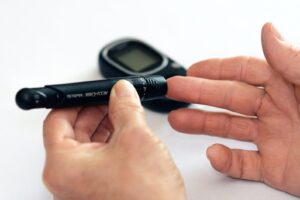 If you’re not treating your sleep apnea, fatigue isn’t the only problem you face. Obstructive sleep apnea (OSA) can affect your physical and mental health. It can increase your risk of various health issues, including type 2 diabetes. Both conditions are connected in several ways. Here’s why you should consider seeking treatment for sleep apnea.
If you’re not treating your sleep apnea, fatigue isn’t the only problem you face. Obstructive sleep apnea (OSA) can affect your physical and mental health. It can increase your risk of various health issues, including type 2 diabetes. Both conditions are connected in several ways. Here’s why you should consider seeking treatment for sleep apnea.
What is Obstructive Sleep Apnea?
OSA is the most prevalent form of the condition. You experience frequent pauses in breathing while sleeping. As your muscles relax, your tongue and the soft tissues in the back of your mouth can collapse, obstructing the airway. This can result in hundreds of breathing disruptions, with each event lasting potentially for 1 minute or longer.
Every breathing disturbance depletes your body of oxygen and interrupts your sleep cycle. You can develop serious issues that affect your overall wellness, like cardiovascular disease, sleep deprivation, and diabetes.
Link Between Sleep Apnea and OSA
Your body requires adequate rest to repair itself and store memories. Your blood pressure and heart rate decrease as you drift off to sleep. Sleeping is also important for regulating insulin in your body. Regulation of the hormone is also important for your body to move glucose from your blood into your cells. If you don’t receive quality sleep, it can interfere with the process, which can cause high blood sugar.
Not only can sleep apnea increase your risk of type 2 diabetes but also vice versa. Obesity is attributed to diabetes. Excess weight is also a contributing factor for obstructive sleep apnea. Even gaining a few pounds can increase your neck circumference and put extra pressure on your airway.
Protect Your Health and Wellness
Eating nutritious foods and exercising regularly is the best solution to maintain a healthy weight. Not only can weight loss decrease your risk of diabetes, but it can also reduce OSA-related symptoms.
Treating Obstructive Sleep Apnea
Although a healthy lifestyle can reduce sleep apnea symptoms, it’s not a substitute for OSA treatment. Your sleep specialist has the solutions you need to breathe better, so you can get the rest you need:
- CPAP: A CPAP machine is the most traditional method of treating sleep apnea. A mask is worn over the mouth or nose to deliver continuous air pressure to prevent breathing disruptions.
- Oral Appliance: As an alternative to a CPAP, an oral appliance can treat mild-to-moderate sleep apnea. It moves your jaw and tongue into a comfortable position to keep your airway open. It can be used alone or along with a CPAP.
It’s never too late to treat sleep apnea. You’ll wake up feeling well-rested and support your general wellness.
About Dr. Gary Radz
Dr. Radz is a top dentist in Colorado, but he’s also a reputable sleep specialist. He has completed extensive education in treating sleep apnea using the latest innovations, like oral appliances. Dr. Radz is affiliated with many professional organizations, including the Academy of Dental Sleep Medicine. Request an appointment through his website or call (720) 903-1649.